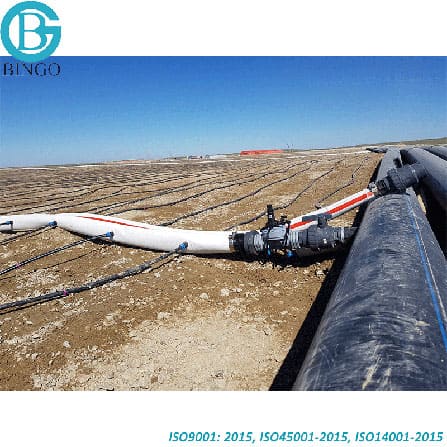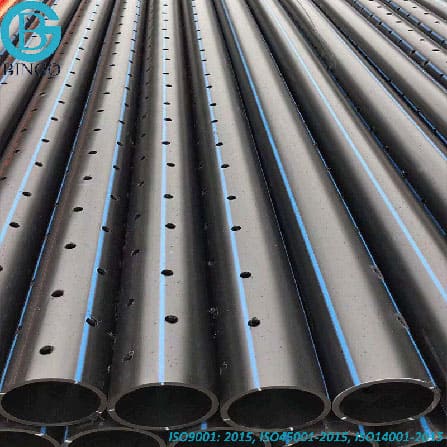A Comprehensive Overview to the Various Uses HDPE Pipe in Building And Construction and Industry
HDPE pipes have actually emerged as a critical component in modern building and commercial applications. Their one-of-a-kind buildings, such as resistance to deterioration and light-weight style, make them suitable for a large range of usages. From water systems to farming watering, HDPE pipelines provide remedies that boost efficiency and sustainability. Recognizing their diverse applications is crucial for professionals looking to enhance infrastructure. What particular advantages do these pipes give each field?
Supply Of Water and Distribution Solutions
Water system and circulation systems are critical components of urban facilities, often relying upon high-density polyethylene (HDPE) pipelines for their toughness and performance. These systems transportation drinkable water from treatment centers to customers, ensuring access and safety. HDPE pipelines are favored for their resistance to rust, chemicals, and extreme temperatures, which boosts their long life and minimizes upkeep costs. Additionally, their light-weight nature permits for less complicated setup and transportation, making them optimal for various urban and country applications.
The adaptability of HDPE pipes enables them to be mounted in limited areas and around obstacles, reducing the need for extensive excavation (Pipe Supplier American Plastics Midland). In addition, their smooth interior surface lowers friction losses, improving water flow prices. As cities continue to grow, the demand for reliable water systems boosts, positioning HDPE pipes as a lasting remedy for modern-day framework tasks. Their tried and tested record makes them a preferred selection among designers and city planners alike
Wastewater Monitoring and Treatment
Efficient wastewater management and treatment are crucial for maintaining public wellness and ecological high quality. HDPE pipelines play an essential duty in this process because of their durability, resistance to rust, and capacity to withstand rough chemicals. These pipes are generally used in numerous applications, including sewer system, stormwater water drainage, and wastewater treatment centers. Their lightweight nature assists in easier setup and transport, lowering labor expenses and time.
On top of that, HDPE pipelines have a smooth indoor surface area that decreases rubbing loss, advertising reliable circulation prices. They are additionally less prone to leakages and failings compared to traditional products, ensuring that impurities are consisted of properly. In addition, their adaptability permits versatility in different soil problems, making them ideal for varied environmental settings. As sectors significantly prioritize sustainable techniques, making use of HDPE pipes in wastewater management systems lines up with objectives for lowering ecological influence and boosting resource healing.
Agricultural Watering Solutions
In agricultural settings, reliable watering services are vital for enhancing crop returns and managing water sources. HDPE (High-Density Polyethylene) pipelines play a crucial duty in contemporary watering systems due to their durability, versatility, and resistance to corrosion. Their capacity to endure high pressures makes them excellent for both surface and subsurface watering applications, guaranteeing consistent water distribution throughout fields.
Farmers can utilize HDPE pipelines in drip irrigation systems, which deliver water directly to plant origins, reducing wastefulness and promoting healthy development. Additionally, these pipes are lightweight and simple to set up, lowering labor costs and installation time. Their long life-span and reduced maintenance demands additionally boost their appeal in agricultural practices.
HDPE pipelines are eco pleasant, as they can be reused and do not seep harmful chemicals into the soil. This makes them a sustainable choice for farmers aiming to adopt green agricultural methods while making best use of productivity.
Industrial Applications and Processes
Flexibility is a trademark of HDPE pipes, making them essential in different industrial applications and processes. These pipes are commonly made use of in chemical handling industries because of their exceptional resistance to a vast array of corrosive substances. HDPE's lightweight nature, integrated with high tensile stamina, enables easy setup and lasting efficiency sought after atmospheres.
In the oil and gas market, HDPE pipelines play an important function in carrying hydrocarbons and gases, many thanks to their toughness and adaptability - custom hdpe pipe manufacturing Midland TX. Furthermore, they are utilized in mining procedures for the transportation of slurry and other materials, where traditional piping systems may stop working
In addition, HDPE pipelines are significantly made use of in making centers for water lines and wastewater administration. Their capacity to hold up against severe temperature levels and pressures makes them suitable for a variety of commercial procedures. On the whole, HDPE pipelines add substantially to effectiveness and safety and security throughout diverse industrial applications.
Stormwater Management and Drainage Equipments
Stormwater administration and drainage systems are essential elements in city facilities, developed to handle excess rainfall and decrease flooding risks. High-density polyethylene (HDPE) pipes are progressively utilized in these systems as a result of their sturdiness, versatility, and resistance to deterioration. These pipes successfully carry stormwater far from inhabited areas, reducing surface area runoff and protecting against waterlogging.
HDPE's lightweight nature facilitates simpler installment, reducing labor prices and construction time. In addition, its resistance to chemicals and environmental stress factors warranties durability and reliability in different environments. Along with traditional drain applications, HDPE pipelines are likewise used in cutting-edge services such as eco-friendly framework, that includes rain yards and permeable pavements.

Often Asked Questions
Exactly How Does HDPE Pipeline Compare to PVC Pipe in Price?
In general, HDPE pipe often tends to be more expensive than PVC pipeline as a result of its enhanced longevity and flexibility. Nevertheless, lasting cost considerations, such as maintenance and life-span, may favor HDPE in details applications.

What Is the Life Expectancy of HDPE Pipes Under Varying Conditions?
HDPE pipes normally have a life expectancy of 50 to 100 years, depending upon ecological problems, installation methods, and use. Variables such as temperature, soil type, and direct exposure to chemicals can significantly affect their longevity.
Can HDPE Pipes Be Recycled After Use?
Yes, here HDPE pipelines can be recycled after use. The recycling process includes thawing down the product, enabling it to be repurposed right into brand-new items, therefore promoting sustainability and reducing environmental effect connected with plastic waste.
Exist Any Kind Of Specific Installation Difficulties With HDPE Pipes?
Installment challenges with HDPE pipes include correct jointing strategies, ensuring sufficient trench conditions, and handling thermal growth. In addition, competent labor is called for to handle specific equipment, which can make complex the installation process in various environments.

What Qualifications Should I Try To Find When Buying HDPE Pipings?
When buying HDPE pipes, one should search for qualifications such as ASTM, AASHTO, and ISO, which confirm top quality and conformity with market requirements, assuring resilience and efficiency in numerous applications. - hdpe pipe fittings Midland TX